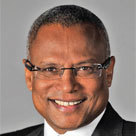
José Maria Neves
Prime Minister
Diplomacy / Cape Verde
“We have a strong interest in developing relations with the Middle East”
The ‘sea cluster’ and, in particular, the construction of a container terminal in Porto Grande is one of the pillars of the national strategy. What do you expect from it?
We would like to become a maritime transportation hub, not only in terms of cargo transportation but also passenger. We are building some cruise terminals but we also want to have cargo container terminals. When speaking of a deepwater port we are basically referring to a container platform. The project is moving forward and, whilst the “sea cluster” is not limited to this container platform, this is a fundamental cornerstone for the development of the sector.
An important initiative of this government is the water collection programme. What is its impact?
Water mobilisation is the most important programme we currently have in progress: the construction of dams and reservoirs, drilling, water desalination or the treatment and collection of wastewater. We want to move millions of cubic meters of water to supply to farmers. This will allow, on the one hand, the public private partnership of the sector and, on the other, the development of new activities. Particularly we point to the processing of agricultural products and ensuring better participation in the tourism market and also in the international market. With the cluster of agribusiness, on which we are stubbornly working, with the mobilisation of water, we also expect to develop the livestock and food industries.
Another important programme is ‘Casa para todos’ (‘Home for All’).
‘Home for All’ is an ambitious program, conceived to broaden access to affordable housing,. In our first phase we are building 8,500 houses. More than 6,500 are already built and we are also establishing a set of financial instruments for the continuity of this process. And with the sale of the flats at controlled costs, we will form an investment fund to build new homes.
The 2008 financial crisis has resulted in a decrease in international financing.
What is the impact of this in terms of financial stress on Cape Verde?
The impact has been great, but fortunately we have managed to withstand the crisis despite an increase in unemployment and some pressure on some social indicators. Even prior to the classification of Cape Verde as a middle-income country, we were taking a set of measures to address the substantial reduction of Official Development Assistance, but we must make an effort. There is no setback in the achievements made in education, health and the fight against poverty. Of course, the big challenge is growth, job creation and poverty eradication.
The Middle East, unlike the rest of the world, finds itself in a situation of excess of capital and seeks to invest more in Africa. What is the extent to which the government of Cape Verde directs its economic diplomacy towards these markets?
We have a strong interest in developing economic and business relations with the Middle East. Cape Verde have established contacts; we have begun a process of accreditation of ambassadors in several countries in the Middle East and we will continue these efforts so that we can arrive at having closer relations with the Middle East.
You are in your last term, with two years still ahead. What are your main objectives for this period?
Our goals are to ensure the stability of economic fundamentals, have an environment conducive for business, have more investment opportunities here in Cape Verde, lead the country to growth, create jobs, and have the conditions to carry out a successful post-2015 agenda.
